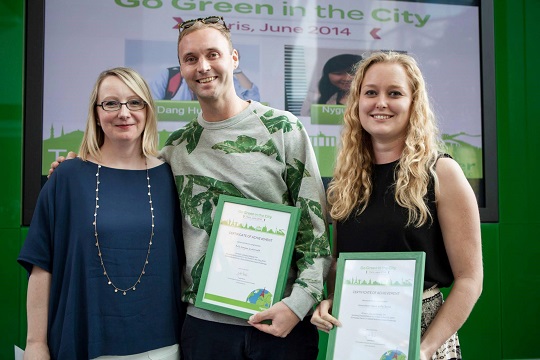SGEES Students Win 2nd Place in Global Competition
SGEES students Genevieve Boyle and Erik Zydervelt, were awarded 2nd place in the global Go Green in the City competition for their “Glowing Futures” entry. The grand finale event was held in Paris from the 17th to the 20th June.

SGEES students Genevieve Boyle (graduated with a Bachelor of Science majoring in Development Studies and Geography), and Erik Zydervelt, (graduated with a Bachelor of Science majoring in Environmental Studies and Geography) were awarded 2nd place in the global Go Green in the City competition for their “Glowing Futures” entry. Competitors in this competition presented ideas for intelligent & efficient energy management for smarter cities. The grand finale event was held in Paris from the 17th to the 20th June.
Dominion Post Article 20 June 2014: 'Smart' lamps could turn Wellington all-a-twinkle
Wellington at night could someday twinkle, as smart streetlights turn them-selves on and off as required, saving costs as well as the planet. Wellington City Council is looking at making its road lighting smarter, more efficient and cheaper - and lamps that brighten and dim based on conditions are one op-tion.
Councillors could draw inspiration from two Victoria University students, Gene-vieve Boyle and Erik Zydervelt, now in Paris - otherwise known as the City of Lights - pitching their idea for cities without unnecessary lights to an interna-tional eco-competition. The proposed system from the recent science gradu-ates would replace Wellington's sodium and mercury bulbs with highly efficient Led versions, powered by solar energy. Each lamp on urban to suburban streets would be rigged with motion detectors, allowing it to gradually fade and turn off if there were no people or vehicles around in need of it.
The "smart" lamps would be connected wirelessly, so if one detected movement the surrounding bulbs would light up as well, ensuring people would be constant-ly surrounded by light, 21-year-old Boyle said. "If you were standing up at the top of Mt Vic, you'd be able to see where people were and what was going on. The city would kind of sparkle on and off, essentially, with the lights." Welling-ton wouldn't be the only thing twinkling - the night sky would be far more spec-tacular with such a network in place, Zydervelt said. "The streetlights produce a huge amount of light pollution."
The pair admitted there would have to be a large upfront investment, but zero running costs and low maintenance costs. The bill for retrofitting Wellington City's 18,000 bulbs could reach $15 million - even without pricey solar power. But with a $2.5m annual bill for the city's street lights, the council also thinks the potential savings make it well worth evaluating.
Strategic planning leader Paul Glennie said Led bulbs were already being used to replace older equipment. Lamps around Courtenay Place would be upgraded in the next month or two. Today's smart streetlights - as well as brightening and fading as needed - could also send emails to the council when they broke, he said. The investment in such technology would soon be presented to councillors for consideration. Solar power could be used in off-the-grid areas, but the technology was thought too expensive for urban areas, Glennie said.
Boyle and Zydervelt, who presented their idea in Paris overnight, are in the running to receive a round-the-world trip from Go Green In The City competi-tion sponsor Schneider Electric.
